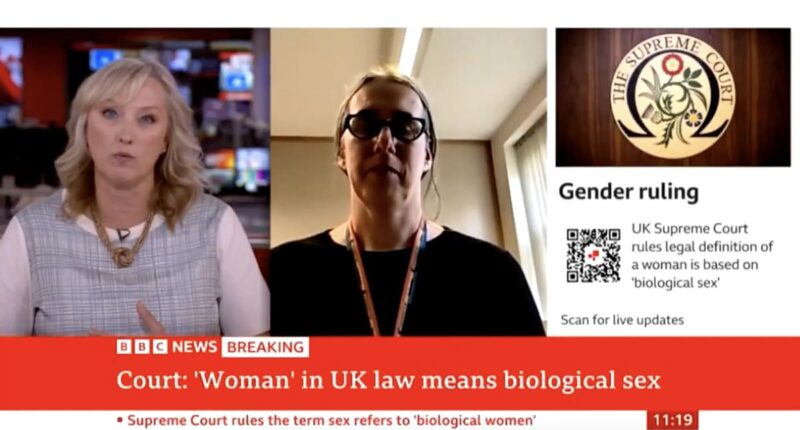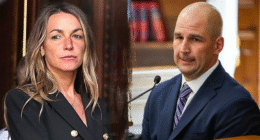
A former Labour MSP candidate who is transgender recently had a heated discussion with BBC newsreader Martine Croxall regarding the Supreme Court’s decision that defines a woman based on biological sex.
Shortly after the groundbreaking ruling, trans activist Heather Herbert’s interview triggered a strong reaction from Croxall when Herbert expressed feeling targeted, stating, ‘I feel like I’m under attack.’
During the interview, Croxall, who repeatedly debated with Herbert, questioned why Herbert viewed it as an ‘attack,’ emphasizing that it was merely a ‘clarification of the term woman.’
The BBC veteran told Herbert the ruling made it clear ‘sex is binary and immutable’ after the trans activist denied local authorities who have not protected single sex spaces based on biological sex may now have to reverse policies.
Croxall challenged Herbert after she called for further ‘clarification’, at one point reminding her: ‘The ruling is that woman means biological sex.’
The tense exchange came after Supreme Court judges decided unanimously that the Equality Act’s definition of a woman is based on biological sex. It means trans women with a Gender Recognition Certificate can be excluded from single-sex spaces if ‘proportionate’.
When asked for her reaction to the ruling which will have far-reaching implications for single-sex spaces, Herbert told Croxall: ‘Obviously I’m disappointed, no judge can tell me who I am.
‘If a judge was to tell you that you’re not a woman, that you’re a man, it wouldn’t change who you are, it wouldn’t change how you feel.’
Herbert went onto claim the UK was ‘following in the footsteps of Trump’s America’, but Croxall pointed out there ‘are already provisions which do protect trans people from discrimination, victimisation and harassment’.
The trans campaigner, who made headlines when she performed dilation exercises following her gender reassignment surgery in a disabled toilet at Gatwick Airport in 2023, claimed it was an ‘attack on minorities’.
But this prompted a furious response from Croxall who said: ‘I’m sorry, but how is this an attack on anyone? It’s just a clarification surely of what the word woman means in the Equality Act.’
Herbert then fired back: ‘Well, I am a woman, so where do I fit in?’ to which Croxall replied: ‘Well, according to this, are you a biological woman is what the law is asking?’
As the interview became more tense, Herbert asked Croxall: ‘Are you a woman? If someone were to say to you, you’re not a woman, would that feel very much like you were under attack? I think it would, I feel like I’m under attack.’
Croxall then asked: ‘So what extra provision would you like to see in response to this? It was a unanimous and unambiguous ruling.’
Herbert replied: ‘It is. We need clarification. It won’t necessarily affect my day to day life but it just feels like it is another attack on trans people.’
But Croxall pressed her, saying: ‘There may have to be, don’t you agree, a reversal in policy by local authorities perhaps who have not protected single sex spaces based on biological sex until now?
When Herbert replied ‘I don’t think so, I would hope not’, Croxall, growing increasingly frustrated bit back: ‘Why would you think not when this makes clear sex is binary and that sex is immutable?’
During the interview, Herbert claimed the ruling would not impact the rights of trans women using female changing rooms.
But Croxall bit back again, saying: ‘That’s not how the group For Women Scotland are seeing it. They are saying sex is real, women can now feel safe that services and spaces designated for women are for women and we are grateful to the court for this ruling.
‘The ruling is that woman means biological sex. The sex that you were observed to have at birth.’
As the interview became more heated, Herbert replied: ‘Are you saying that I can’t participate in public life? I think it makes no difference to how trans people will go about their day to day lives.
She added: ‘Do you think I should be allowed in the women’s toilets?
‘If I’m not, if you’re implying that I shouldn’t, that would mean that I don’t have any ability to be in public life at all. I can’t go to work because you’re saying that I can’t use the loo at work.’
Herbert, who quit Labour for the Scottish Greens, previously made headlines when she posted an image of herself lying on the floor of a disabled loo at Gatwick doing ‘dilation’ exercises after gender reassignment surgery in 2023.
She said: ‘Found a disabled toilet… not the most fun I’ve had.’ Doctors say the exercises need to be done daily to promote healing.
Herbert was born in Leicester but moved to Scotland in 2013.
She voted for independence four years later and joined Scottish Labour, saying that she was ‘hoping to move the party to the Left’ but ‘failed’.
Herbert was heavily critical of the Supreme Court ruling that gender is defined by biology.
Her concerns were echoed by Ella Morgan, the first trans woman to appear on Married at First Sight UK.
Speaking on Good Morning Britain, the reality TV star said: ‘As a voice for the trans community since I have been in the public eye. I have always seen the good in everything and I have always been very positive.
‘But for the first time since I have had the title and role I actually do feel nervous and scared not only for myself but for the community because its the unknown.
‘It’s been said but there’s not clarity. We are not sure exactly what is going to happen in terms of passports, toilets, gym changing rooms.
‘There are so many things logistically that needs to be discussed and then to have the headline ‘the definition of a woman is biological sex’, makes me feel and trans people feel that we are defined as a man.
‘I’m essentially a man in a lot of peoples eyes and now legally potentially on paper I could be and that’s scary.’
As the country reacts to the decision, the head of Britain’s equalities watchdog said trans women cannot use single-sex female toilets, changing rooms or compete in women’s sports.
Equality and Human Rights Commission (EHRC) chairwoman Baroness Kishwer Falkner said Wednesday’s ruling was ‘enormously consequential’ and brought clarity, as she vowed to pursue organisations which do not update their policies.
The ruling that the terms woman and sex in the 2010 Equality Act ‘refer to a biological woman and biological sex’ means transgender women with a gender recognition certificate (GRC) can be excluded from single-sex spaces if ‘proportionate’, the Supreme Court said.
Baroness Falkner said organisations should be ‘taking care’ to look at the ‘very readable judgment’ to ‘understand that it does bring clarity, helps them decide what they should do’.
Asked if it was now simple that trans women cannot take part in women’s sport, she told BBC Radio 4’s Today programme: ‘Yes, it is.’
On changing rooms and toilets, Baroness Falkner said: ‘Single-sex services like changing rooms must be based on biological sex.
‘If a male person is allowed to use a women-only service or facility, it isn’t any longer single-sex, then it becomes a mixed-sex space.
‘But I have to say, there’s no law that forces organisations, service providers, to provide a single-sex space, and there is no law against them providing a third space, an additional space, such as unisex toilets for example, or changing rooms.’
She suggested trans rights organisations ‘should be using their powers of advocacy to ask for those third spaces’.
The commission is expecting to lay an updated statutory code of practice before Parliament by the summer, and has said it is working ‘at pace to incorporate the implications of this judgment’ into the code for public bodies setting out their duties under the Equality Act.
Baroness Falkner said the commission evaluates when the law is not followed by organisations and can speak to those bodies, or ‘use enforcement, compliance tools or whatever, we will be continuing to do that’.
Regarding single-sex hospital wards, she said the NHS will ‘have to change’ their 2019 policy, which says that trans people ‘should be accommodated according to their presentation’.
Baroness Falkner said the court ruling means there is now ‘no confusion’ and the NHS ‘can start to implement the new legal reasoning and produce their exceptions forthwith’.
Officials said they were already updating the guidance but the judgment will be considered as they move forward.
Care minister Karin Smyth told BBC Breakfast the ‘NHS will obviously be complying’ along with ‘every other public body’.
She said she hopes the ruling will draw a line under arguments over gender recognition, but accepted more ‘homework’ needed to be done on what it will mean in practice.
The Supreme Court decision was hailed as a victory by women’s rights campaigners, but LGBT charity Stonewall described the judgment as ‘incredibly worrying for the trans community’.
Baroness Falkner said while the ruling is a ‘victory for common sense’, this is only the case ‘if you recognise that trans people exist’.
She added: ‘They have rights, and their rights must be respected – then it becomes a victory for common sense.’
She added: ‘It’s not a victory for an increase in unpleasant actions against trans people. We will not tolerate that.
‘We stand here to defend trans people as much as we do anyone else. So I want to make that very clear.’











![Anne Burrell: Food Network Chef Found Dead Near Dozens of Pills [Report]](https://bbcgossip.com/wp-content/uploads/2025/06/Anne-Burrell-Food-Network-Chef-Found-Dead-Near-Dozens-of-380x200.jpg)





